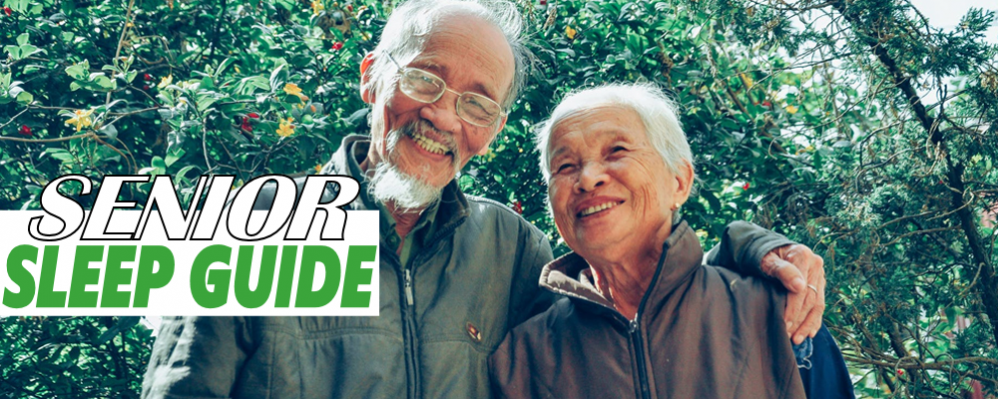Mattresses
Shop Adjustable Beds for Seniors
Sleep Guide for Seniors
It can be hard to get the recommended amount of sleep every night. No matter where you are in life, things creep up that interrupt your ability to sleep well. It’s a cycle, really. Babies wake often for feeding, but somehow instinctively know they need to sleep and still maintain their overall sleep quantity. Kids get busy with gymnastics, karate or any number of other activities. These can leave them amped up and unable to sleep. It could also, in some cases cause exhaustion and oversleeping, which is not good either. The stress of being a teenager may lead to insomnia or anxiety that keeps you up. Then we go into adulthood where the stress increases and the obligations do as well. The next thing you know, you are a parent and your newborn is making it difficult to get that solid seven hours sleep each night. Then you grow up, and become an official senior. All the pressure is off and you’re going to finally be able to get a good night’s sleep, right? If it were only that easy!
Interesting Statistics
- Around 45% of seniors have Restless Legs Syndrome to some degree.
- On average, seniors wake between 3-4 times every night.
- Insomnia affects as much as 50% of adults ages 65 years and older.
Needs as You Age
Sleep quantity requirements vary by age. Babies, kids and adolescents need much more sleep than middle aged adults and seniors. The average senior should get between 7-8 hours sleep each night. That can be a lofty goal as physical aches and pains can often cause waking in the night. However, it is important to achieve this amount of sleep in order to optimize the results of quality sleep.
Common Sleep Stages and Why They are Important
While asleep, the body and mind experience several phases of sleep. Each of these stages plays an important role. Each also builds on the other stages. In the first few minutes of sleep, a person will experience a transitional period. In this part of sleep, a person is partly awake and partly asleep. The second stage of sleep prepares the body and mind for the next few stages. Brain activity, heart rate and even body temperature undergo changes in preparation. The next step is a deeper and more restorative sleep. This phase is responsible for the bulk of mind and body repair. It’s in stage three that bodily tissues heal and strengthen. It impacts a person on the cellular level within muscles, bones and even affecting bodily systems such as the immune system. At the end of this essential stage, a deeper sleep is attained making way for REM. This highly restful, deep sleep is the part of sleep where dreaming occurs. Its effects on brain activity are numerous.
The Difference Between Light and Deep Sleep
If you’re sleeping at all, you will get some light sleep. It occurs in the early stages of sleep so in order to get to the deeper, REM sleep, it’s along the way. Light sleep, because of the way it prepares your body for REM, is important. Most of the sleep you will get is considered to be light sleep. Deep sleep, accounts for about a quarter of the sleep you should get. Though multiple studies indicate that the elderly get less slow wave sleep overall compared to younger people.

How much sleep do seniors need?
So, according to the National Sleep Foundation, seniors should be aiming for 7-8 hours of sleep each night. That’s for those 65 years of age and older. Before that, younger senior citizens can get a healthy 7-9 hours sleep. This guideline was established by a panel of doctors and sleep experts. It’s the current authority on sleep recommendations.
Sleep Disorders Issues
So, what keep seniors up at night? Sometimes it’s a matter of pain. Other times, it is a medical condition. Back pain and arthritis are very common among seniors. This can make even the act of getting into bed problematic. Sleep apnea and acid reflux are also common ailments that seniors struggle with that can impact the ability to sleep well. Circulation can also be an issue. Throbbing or aches can make it hard to sleep and cramping can cause waking in the night.
In data examined by Carl J. Stepnowsky Jr, PhD and Sonia Ancolo-Israel, PhD, approximately 50% of the elderly reports indicated some sort of problem surrounding sleep. Some common complaints regarding sleep from the elderly include:
- Heightened level of daytime drowsiness.
- Increased frequency of daytime napping.
- Waking up more often during the night.
- Taking too much time to fall asleep.
- Sleeping less overall.
Reasons Seniors Struggle with Sleep
There are multiple reasons one might struggle with getting adequate sleep. Seniors specifically can experience the following that causes interference.
- Acute medical conditions; asthma for instance.
- Chronic illnesses including cardiovascular conditions and overactive bladder.
- Sleep disorders such as REM sleep behavior disorder, sleep apnea, advanced sleep phase disorder and restless leg syndrome.
- Behavioral causes like napping during the day or insufficient exercise.
- Alcohol use.
- Environmental factors; comfort of bed, light and/or noise pollution.
Simple Sleep Solutions
Try these tips if you are having a hard time getting the sleep you need.
- Find the appropriate bed height. This can make all the difference when it comes to getting in and out of bed safely.
- Elevate the head to ease symptoms of GERD and also potentially help with sleep apnea.
- Adjust your sleep position. The way you sleep can impact circulation, back pain, neck pain and more.
- Try pre-bedtime massage. This may help with circulation, pain management and it may also help reduce anxiety or depression.
Fundamental Solutions for Better Sleep
Some things can help you sleep better, no matter what age you are. The following are common ways to achieve better, more quality sleep.
- Turn out the lights. Use black out curtains. Shut off electronics. Our biological clock is tuned to the presence of light. Light exposure can signify it is time to be awake and intrude on our ability to maintain a good sleep schedule.
- Get active during the day as much as possible. Exercise is good for your health and it also helps you to sleep better at night.
- Designate the bed for sleep only. Especially as we age, the bed can become more like our living space. Try to only get into bed when you are planning to sleep. It will create a signal to the brain that this is what happens in bed.
- Get on a schedule. This means limiting fluctuations in sleep times. Avoid daytime napping as well as going to bed too early.
- Skip late day stimulants including coffee, tea and chocolate.
- Talk to your physician about any sleep concerns you have. A doctor may be able to provide personalized sleep solutions or adjust medications to help you sleep better.
Helpful Guides and Stats for Seniors
- The Senior Sleep Statistics page shows researched senior statistics and facts for seniors.
- The Bedroom Safety for Elderly Guide helps understand ways to improve the home for senior safety.
Sources
- https://www.healthline.com/health/how-much-deep-sleep-do-you-need#increasing-deep-sleep
- https://www.sleepfoundation.org/press-release/national-sleep-foundation-recommends-new-sleep-times
- https://restrightmattress.com/best-bed-height-for-seniors/
- https://newsroom.uhc.com/health/awareness/sleeping-positions-for-better-health.html
- https://www.mayoclinichealthsystem.org/hometown-health/speaking-of-health/can-massage-relieve-symptoms-of-depression-anxiety-and-stress
- https://www.ncbi.nlm.nih.gov/pmc/articles/PMC2516307/
- https://www.sleepfoundation.org/articles/aging-and-sleep
- https://medlineplus.gov/ency/article/004018.htm
- https://www.ncbi.nlm.nih.gov/pmc/articles/PMC5300306/
- https://www.ncbi.nlm.nih.gov/pmc/articles/PMC5689397/
- https://www.aarp.org/health/healthy-living/info-2019/latest-sleep-research.html
© 2025 Rest Right Mattress. All Rights Reserved.



